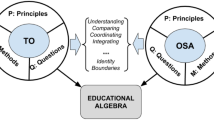Abstract
Algebraic symbols do not speak for themselves. What one actually sees in them depends on the requirements of the problem to which they are applied. Not less important, it depends on what one is able to perceive and prepared to notice. It is this last statement which becomes the leading theme of this article. The main focus is on the versatility and adaptability of student’s algebraic knowledge
The analysis is carried out within the framework of the theory of reification according to which there is an inherent process-object duality in the majority of mathematical concepts. It is the basic tenet of our theory that the operational (process-oriented) conception emerges first and that the mathematical objects (structural conceptions) develop afterward through reification of the processes. There is much evidence showing that reification is difficult to achieve.
The nature and the growth of algebraic thinking is first analyzed from an epistemological perspective supported by historical observations. Eventually, its development is presented as a sequence of ever more advanced transitions from operational to structural outlook. This model is subsequently applied to the individual learning. The focus is on two crucial transitions: from the purely operational algebra to the structural algebra ‘of a fixed value’ (of an unknown) and then from here to the functional algebra (of a variable). The special difficulties experienced by the learner at both these junctions are illustrated with much empirical data coming from a broad range of sources.
Access this chapter
Tax calculation will be finalised at checkout
Purchases are for personal use only
Preview
Unable to display preview. Download preview PDF.
Similar content being viewed by others
References
Behr, M., Erlwanger, S. and Nichols, E.: 1976, How Children View Equality Sentences,(PMDC Technical Report No. 3), Florida State University (ERIC Document Reproduction Service No. ED 144802).
Bell, A.: 1992, ‘School algebra — what it is and what it might be’, paper presented at the meeting of Algebra Working Group at ICME 7, Quebec, Canada.
Beth, E. W. and Piaget, J.: 1966, Mathematical Epistemology and Psychology, D. Reidel Publishing Company, Dordrecht, The Netherlands.
Booth, L.: 1988, ‘Children’s difficulties in beginning algebra’, in A. F. Coxford (ed.), The Ideas of Algebra, K-12 ( 1988 Yearbook), NCTM, Reston, VA, pp. 20–32.
Boyer, C. B.: 1985, A History of Mathematics, Princeton University Press, Princeton, NJ (originally published in 1968 ).
Breidenbach, D., Dubinsky, E., Hawks, J. and Nichols, D.: 1992, ‘Development of the process conception of function’, Educational Studies in Mathematics 23, 247–285.
Chalouh, L. and Herscovics, N.: 1988, ‘Teaching algebraic expressions in a meaningful way’, in A. F. Coxford (ed.), The Ideas of Algebra ( 1988 Yearbook), NCTM, Reston, VA, pp. 33–42.
Clement, J., Lochhead, J. and Soloway, E.: 1979, Translation Between Symbol Systems: Isolating a Common Difficulty in Solving Algebra Word Problems. COINS technical report No. 79–19
Department of Computer and Information Sciences, University of Massachusetts, Amherst. Cobb, P.: 1988, ‘The tension between theories of learning and instruction in mathematics education’, Educational Psychologist 23, 87–104.
Collis, K. F.: 1974, ‘Cognitive development and mathematics learning’, paper presented at Psychology of Mathematics Education Workshop, Center for Science Education, Chelsea College, London.
Crowe, M.: 1988, ‘Ten misconceptions about mathematics and its history’, in W. Asprey and P. Kitcher (eds.), History and Philosophy of Modern Mathematics, Minnesota Studies in the Philosophy of Science, Vol. XI, University of Minnesota Press, Minneapolis.
Davis, P.: 1975, ‘Cognitive processes involved in solving simple arithmetic equations’, Journal of Children’s Mathematical Behavior 1 (3), 7–35.
Davis, R.: 1989, ‘Research studies in how humans think about algebra’, in S. Wagner and C. Kieran (eds.), Research Issues in the Learning and Teaching of Algebra, Lawrence Erlbaum, NCTM, Hillsdale, NJ, pp. 266–274.
Davis, R.: 1988, ‘The interplay of algebra, geometry, and logic’, Journal of Mathematical Behavior 7, 9–28.
Douady, R.: 1985, ‘The interplay between different settings: Tool-object dialectic in the extension of mathematical ability–Examples from elementary school teaching’, in L. Streefland (ed.), Proceedings of the Ninth International Conference for the Psychology of Mathematics Education, Vol. 2, State University of Utrecht, Subfaculty of Mathematics, OWandOC, Utrecht, The Netherlands, pp. 33–52.
Dreyfus, T. and Halevi, T.: 1988, ‘Quadfun - A case study of pupil-computer interaction’, paper presented to the theme group on Microcomputers and the Teaching of Mathematics at ICME 6, Budapest, Hungary.
Dubinsky, E.: 1991, ‘Reflective abstraction in advanced mathematical thinking’, in D. Tall (ed.), Advanced Mathematical Thinking, Kluwer Academic Publishers, Dordrecht, pp. 95–123.
Dubinsky, E. and Hard, G. (eds.): 1992, The Concept of Function: Aspects of Epistemology and Pedagogy,MAA Notes, Vol. 25, Mathematical Association of America.
Even, R.: 1988, ‘Pre-service teachers’ conceptions of the relationship between functions and equations’, in Borbas (ed.), Proceedings of the Twelfth International Congress of the PME, Vol. I, Vesprem, Hungary, pp. 304–311.
Fauvel, J. and Gray, J.: 1987, The History of Mathematics -A Reader, Macmillan Education, London, The Open University, Milton Keynes.
Filloy, E. and Rojano, T.: 1985, ‘Operating the unknown and models of teaching’, in S. K. Damarin and M. Shelton (eds.), Proceedings of the Seventh Annual Meeting of PME-NA, Ohio State University, Columbus, pp. 75–79.
Filloy, E. and Rojano, T.: 1989, ‘Solving equations: the transition from arithmetic to algebra’, For the Learning of Mathematics 9 (2), 19–25.
Frege, G.: 1970, ‘What is function?’, in P. Geach and M. Black (eds.), Translations from the Philosophical Writings of Gottlob Frege, Blackwell, Oxford (German original published in 1904 ).
Freudenthal, H.: 1978, Weeding and Sowing, D. Reidel Publishing Company, Dordrecht, The Netherlands.
Garcia, R. and Piaget, J.: 1989, Psychogenesis and the History of Science, Columbia University Press, New York.
Greeno, G. J.: 1983, ‘Conceptual entities’, in D. Genter and A. L. Stevens (eds.), Mental Models, pp. 227–252.
Gregory, D. F.: 1840, On the Nature of Symbolic Algebra,Trans. Roy. Soc., Vol. 14, Edinburgh, pp. 208–216.
Gray, E. and Tall, D. O.: 1991, ‘Duality, ambiguity and flexibility in successful mathematical thinking’, in F. Furinghetti (ed.), Proceedings of the Fifteenth Conference for the Psychology of Mathematics Education, Vol. 2, Assisi, Italy, pp. 72–79.
Hadamard, J. S.: 1949, The Psychology of Invention in the Mathematics Field, Princeton University Press, NJ.
Harel, G. and Kaput, J.: 1991, The role of conceptual entities in building advanced mathematical concepts and their symbols’, in D. Tall (ed.), Advanced Mathematical Thinking, Kluwer Academic Publishers, Dordrecht, The Netherlands, pp. 82–94.
Harper, E.: 1987, ‘Ghost of Diophantus’, Educational Studies in Mathematics 18, 75–90.
Herscovics, N. and Linchevski, L.: 1991, ‘Pre-algebraic thinking: range of equations and informal solutions used by seventh graders prior to any instruction’, in F. Furinghetti (ed.), Proceedings of the Fifteenth Conference for the Psychology of Mathematics Education, Vol. 2, Assisi, Italy, pp. 173–180.
Herscovics, N. and Linchevski, L.: 1993, ‘The cognitive gap between arithmetics and algebra’, forthcoming in Educational Studies in Mathematics.
Kaput, J. J.: 1989, ‘Linking representations in the symbol system of algebra’, in S. Wagner and C. Kieran (eds.), Research Issues in the Learning and Teaching of Algebra, Lawrence Erlbaum, Hillsdale, NJ, pp. 167–194.
Kieran, C.: 1981, ‘Concepts associated with equality symbol’, Educational Studies in Mathematics 12 (3), 317–326.
Kieran, C.: 1988, ‘Two different approaches among algebra learners’, in A. F. Coxford (ed.), The Ideas of Algebra ( 1988 Yearbook), NCTM, Reston, VA, pp. 91–96.
Kieran, C.: 1991, ‘A procedural-structural perspective on algebra research’, in F. Furinghetti (ed.), Proceedings of the Fifteenth International Conference for the Psychology of Mathematics Education, Vol. 2, Assisi, Italy, pp. 245–254.
Kieran, C.: 1992, ‘The learning and teaching of school algebra’, in D. A. Grouws (ed.), The Handbook of Research on Mathematics Teaching and Learning, Macmillan, New York, pp. 390–419.
Kleiner, I.: 1989, ‘Evolution of the function-concept: A brief survey’, College Mathematics Journal 20 (4), 882–300.
Lakoff, G. and Johnson, M.: 1980, The Metaphors We Live By, University of Chicago Press, Chicago.
Linchevski, L. and Sfard, A.: 1991, ‘Rules without reasons as processes without objects–The case of equations and inequalities’, in F. Furinghetti (ed.), Proceedings of the Fifteenth Conference for the Psychology of Mathematics Education, Vol. 2, Assisi, Italy, pp. 317–324.
Mason, J. H.: 1989, ‘Mathematical subtraction as the results of a delicate shift of attention’, For the Learning of Mathematics 9 (2), 2–8.
Moschkovich, J., Schoenfeld, A. and Arcavi, A.: 1992, ‘What does it mean to understand a domain: A case study that examines equations and graphs of linear functions’, paper presented at the 1992 Annual Meeting of the American Educational Research Association, San Francisco, CA.
Novy, L.: 1973, Origins of Modern Algebra, Noordhoff International Publishing, Leiden, The Netherlands.
Schoenfeld, A. H., Smith, J. P. and Arcavi, A.: 1993, ‘Learning: The microgenetic analysis of one student’s evolving understanding of a complex subject matter domain’, forthcoming in R. Galser (ed.), Advances in Instructional Psychology, Vol. 4, Lawrence Erlbaum, Hillsdale, NJ.
Schwartz, B., Dreyfus, T. and Bruckheimer, M.: 1990, ‘A model of function concept in a three-fold representation’, Computers and Education 14, 249–262.
Sfard, A.: 1987, ‘Two conceptions of mathematical notions: operational and structural’, in J. C. Bergeron, N. Hershcovics and C. Kieran (eds.), Proceedings of the Eleventh International Conference for Psychology of Mathematics Education, Vol. III, Université de Montréal, Montréal, Canada, pp. 162–169.
Sfard, A.: 1989, ‘Transition from operational to structural conception: The notion of function revisited’, in G. Vergnaud, J. Rogalski and M. Artigue (eds.), Proceedings of the Thirteenth International Conference for the Psychology of Mathematics Education, Vol. 3, Laboratoire PSYDEE, Paris, pp. 151–158.
Sfard, A.: 1991, ‘On the dual nature of mathematical conceptions: Reflections on processes and objects as different sides of the same coin’, Educational Studies in Mathematics 22, 1–36.
Sfard, A.: 1992, ‘Operational origins of mathematical notions and the quandary of reification–the case of function’, in E. Dubinsky and G. Hazel (eds.), The Concept of Function: Aspects of Epistemology and Pedagogy, MAA Notes, Vol. 25, Mathematical Association of America, pp. 59–84.
Sfard, A. and Linchevski, L.: 1993, ‘Processes without objects -the case of equations and inequalities’, forthcoming in a special issue of Rendiconti del Seminario Matematico dell’Universita e del Politecnico di Torino.
Soloway, E., Lochhead, J. and Clement, J.: 1982, ‘Does computer programming enhance problem solving ability? Some positive evidence on algebra word problems’, in R. J. Seidel and R. E. Anderson (eds.), Computer Literacy, Academic Press, New York.
Struik, D. J.: 1986, A Source Book in Mathematics, 1200–1800, Princeton University Press, Princeton, NJ (originally published in 1969 ).
Vergnaud, G., Benhdj, J. and Dussouet, A.: 1979, La coordination de l’enseignement des mathématiques entre les cours moyen 2e année et la classe de sixième, Institut National de Recherche Pédagogique, Paris.
Wagner, S.: 1981, ‘Conservation of equation and function under transformations of variable’, Journal for Research in Mathematics Education 12, 107–118.
Wagner, S. and Kieran, C.: 1989, ‘An agenda for research on the learning and teaching of algebra’, in S. Wagner and C. Kieran (eds.), Research Issues in the Learning and Teaching of Algebra, Lawrence Erlbaum, Hillsdale, NJ, pp. 220–237.
Waits, B. K. and Demana, F.: 1988, ‘New models for teaching and learning mathematics through technology’, paper presented to the theme group on Microcomputers and the Teaching of Mathematics at ICME 6, Budapest, Hungary.
Wheeler, D.: 1989, ‘Context for the research on teaching and learning algebra’, in S. Wagner and C. Kieran (eds.), Research Issues in the Learning and Teaching of Algebra, Lawrence Erlbaum, Hillsdale, NJ, pp. 278–287.
Author information
Authors and Affiliations
Editor information
Editors and Affiliations
Rights and permissions
Copyright information
© 1994 Springer Science+Business Media Dordrecht
About this chapter
Cite this chapter
Sfard, A., Linchevski, L. (1994). The Gains and the Pitfalls of Reification — The Case of Algebra. In: Cobb, P. (eds) Learning Mathematics. Springer, Dordrecht. https://doi.org/10.1007/978-94-017-2057-1_4
Download citation
DOI: https://doi.org/10.1007/978-94-017-2057-1_4
Publisher Name: Springer, Dordrecht
Print ISBN: 978-90-481-4397-9
Online ISBN: 978-94-017-2057-1
eBook Packages: Springer Book Archive




